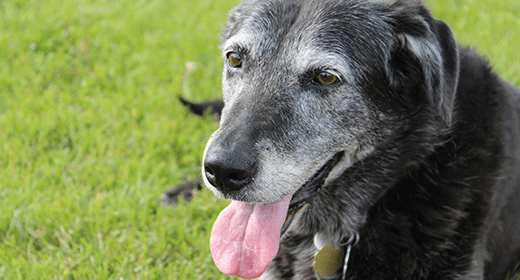

As dogs age, changes occur in the way their bodies function, so it makes sense that what they eat also might need to change. The following list of health issues might be more common in aging pets.
Decreased Immune System Function
Throughout a dog’s life, a process called peroxidation occurs. Peroxidation is a normal process that the body uses to destroy cells that outlive their usefulness and to kill germs, parasites, etc. This process, however, also can destroy or damage healthy cells. As your dog ages, the damage caused by peroxidation accumulates, which, in turn, increases the risk of certain problems, such as infections.
Antioxidants are naturally occurring nutrients that help maintain overall health by neutralizing the peroxidation process of cellular molecules. Some antioxidants, such as vitamin E, beta-carotene, and lutein, are naturally occurring nutrients.
Recent research sponsored by The IAMS™ Company found that dogs fed a diet rich in antioxidants such as vitamin E, lutein, or beta-carotene had improved immune responses and vaccine recognition. This might be especially important in senior dog care; IAMS research has found that as dogs age, immune responses can decrease.
More Frequent Intestinal Problems
Older dogs might have higher numbers of unfavorable bacteria and lower numbers of beneficial bacteria in their intestines, which can result in clinical signs of gastrointestinal problems (e.g., diarrhea).
Feeding a diet containing fructooligosaccharides (FOS), a unique fiber source that helps nutritionally maintain healthy intestinal bacterial populations, promotes growth of beneficial bacteria. Beet pulp, a moderably fermentable fiber source, also helps maintain intestinal health by providing energy for the cells lining the intestine and promoting small, firm stools.
Different dogs show signs of aging at different times, and much of this variation is associated with size. Larger dogs generally appear 'old' sooner than smaller dogs. The table below lists the age at which various groups of dogs should be transitioned to senior foods, such as IAMS™ ProActive Health™ Senior Plus.
| Weight Range | Age to Begin Transition |
|---|---|
| More than 90 lbs | 5 years |
| 51 to 90 lbs | 6 years |
| 21 to 50 lbs | 7 years |
| Up to 20 lbs | 7 years |


Not all small dogs have the same nutritional needs. Giving your dog a food specially formulated for her size and activity level is the easiest way to make sure you’re providing complete and balanced nutrition. Here’s how to provide the right nutrition for your small dog.
Small adult dogs require a food that offers complete nutrients essential for health and vitality. Here’s what to look for:
These ingredients are the keys to nutrition whether you feed dry or wet dog food or give your dog treats.
Small dogs have small mouths and stomachs. You may want to feed your dog a formula with a small bite size for easy chewing. A nutrient-dense food will help make sure she’s absorbing essential nutrients even though her stomach can only accommodate what seems like a small volume of food.
When choosing a food for your small-breed dog, also ask:
Special conditions like these dramatically affect your dog’s nutritional demands.
Less-active dogs and dogs who have been neutered or spayed are prone to weight gain. Controlling your dog’s weight is an important step toward protecting against complications of excess weight, such as diabetes or joint health problems. If you use a weight-control food, look for these ingredients:
Starting in the seventh week of her pregnancy, a mother dog will need to increase her energy intake up to 50% by the time she gives birth and increase it even more when she starts nursing her puppies. Because she may lose her appetite at times, it’s important that she eats a nutrient-dense food. A complete, balanced small-breed puppy formula can give her the extra nutrients she needs.
Unlike larger dogs that are considered mature at age 5, your small dog can remain on an adult diet until age 7. In fact, small-breed dogs tend to live longer and don’t experience age-related changes as early as bigger dogs. However, it is important to make a proactive transition to a specially formulated mature diet, such as IAMS™ ProActive Health™ Mature Adult Small & Toy Breed, so you can help keep your dog healthy and active for years to come.

